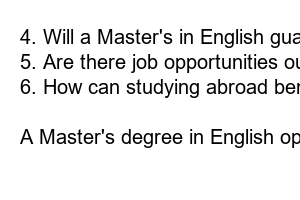스승 찾기
Title: Find a Master in English: Unlocking Your Language Potential
Subheadings:
1. Introduction: Why Pursue a Master’s Degree in English?
2. Finding the Right Master’s Program
3. Benefits of Pursuing a Master’s in English
4. Studying Abroad: Expanding Your Horizons
5. Application Process: Tips for Success
6. Financing Your Master’s Degree
7. Frequently Asked Questions (FAQs)
Introduction: Why Pursue a Master’s Degree in English?
Are you passionate about the English language? Do you dream of becoming an expert in literature, linguistics, or creative writing? Pursuing a Master’s degree in English can unlock a treasure trove of opportunities for individuals like you. Whether you aspire to teach, write, or work in various industries that value strong communication skills, a Master’s in English can be your pathway to success.
Finding the Right Master’s Program
With numerous universities and colleges offering Master’s programs in English, it can be overwhelming to find the right fit. An extensive online search, attending education fairs, and reaching out to professors and professionals in the field can help you narrow down your options. Consider factors such as curriculum, faculty expertise, research opportunities, and potential for interdisciplinary studies.
Benefits of Pursuing a Master’s in English
1. Enhanced Critical Thinking: A Master’s in English nurtures the ability to analyze complex texts, develop logical arguments, and think critically – skills highly valued in various industries.
2. Communication Excellence: Mastering the English language equips you with excellent oral and written communication skills, which are crucial in any professional setting.
3. Multifaceted Career Opportunities: From academia and publishing to marketing, journalism, and public relations – an English degree opens doors to diverse career paths.
4. Personal Growth: Engaging with literature, language, and theory can provide immense personal growth, fostering empathy, cultural understanding, and broadening your worldview.
Studying Abroad: Expanding Your Horizons
If you’re seeking an extraordinary academic experience and a chance to immerse yourself in a different culture, considering studying abroad for your Master’s in English can be an excellent choice. It offers a unique opportunity to explore international perspectives, build a global network, and expand your horizons beyond academia.
Application Process: Tips for Success
Navigating the application process can be daunting, but with proper preparation, it can become an exciting journey. Start by identifying the admission requirements, be it standardized tests, recommendation letters, or writing samples. Craft a compelling personal statement highlighting your passion, ambitions, and how a Master’s in English aligns with your goals. Remember to proofread meticulously and meet all deadlines.
Financing Your Master’s Degree
While pursuing a Master’s degree is an investment in your future, it’s essential to consider financial considerations. Explore various funding options, such as scholarships, fellowships, teaching or research assistantships, and grants. Additionally, part-time work, online courses, or employer sponsorship can alleviate financial burdens.
Frequently Asked Questions (FAQs):
1. Can I pursue a Master’s in English without a Bachelor’s in English?
Yes, many programs accept candidates from diverse academic backgrounds, including related fields like communications or humanities.
2. How long does it typically take to complete a Master’s in English?
Master’s programs in English usually range from one to two years, depending on the course load and availability of part-time options.
3. Can I pursue a Master’s in English if English is not my first language?
Yes, many programs offer English language support and resources to help non-native speakers succeed.
4. Will a Master’s in English guarantee a teaching position?
While a Master’s degree can be desirable for teaching positions, additional qualifications and experiences may be required in some educational settings.
5. Are there job opportunities outside of academia with a Master’s in English?
Absolutely! Strong communication and critical thinking skills gained through a Master’s in English are sought-after in various industries, including marketing, publishing, public relations, and more.
6. How can studying abroad benefit my Master’s in English?
Studying abroad can provide you with a diverse and global perspective, enhancing your understanding of literature and language in an international context.
Summary:
A Master’s degree in English opens doors to a fulfilling and multifaceted career. By choosing the right program, honing your critical thinking and communication skills, and considering studying abroad, you can embark on an exciting journey of personal and professional growth. Take advantage of the various funding options available and navigate the application process with confidence to unlock your full language potential.

